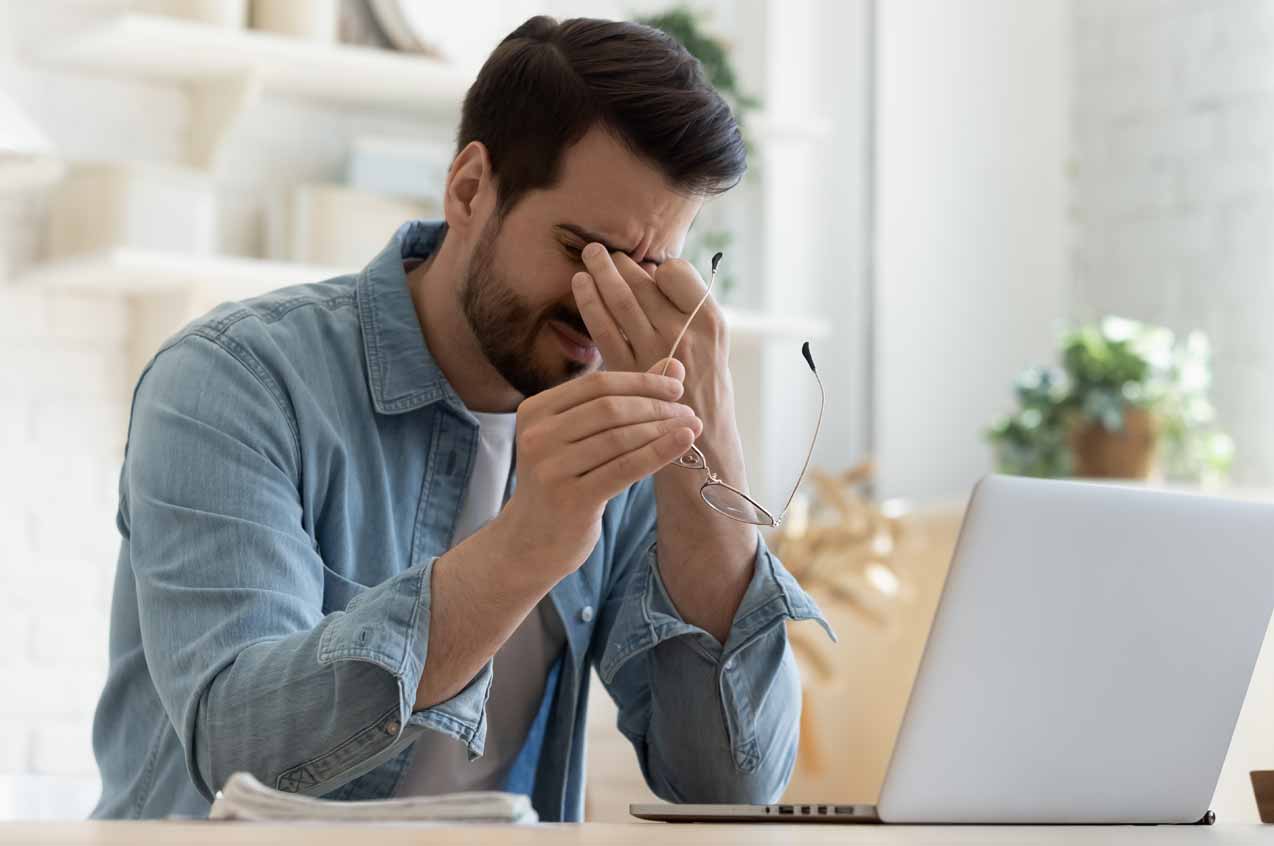As mundane as our working lives are, stress often puts us in uncomfortable situations. It can hit us suddenly, turning the moment into a huge mountain of problems. But constant stress can also "sneak up" on us and become a habitual companion unnoticed. Then sooner or later stress-related symptoms appear. One of these sequelae is Hair loss. Here, the hair root or follicle is shown to be damaged. The good news is that if the cause is not genetics and thus no hereditary hair loss (androgenetic alopecia) is present, the symptoms can be combated very well. In this blog post, we want to tell you exactly what you can do. How can stress be triggered and why should you avoid it in the first place? What to do when you are already quite overwhelmed? How to deal with such moments?
Just keep calm! As with many difficulties in life, you should proceed with a cool head when it comes to mental problems. The whole thing is a matter of the head.
Hair loss stress - How permanent stress affects your hair
If you are under constant tension, you should realize that it can be responsible for the loss of hair. For example, there is a diffuse hair lossin which the hair cycle and its growth phase are disturbed. But a circular loss of hair (alopecia areata) is also possible. However, the exact cause of this type is not known. Stress-related hair loss is not the only consequence if you are permanently tense. Other symptoms can also be alarm signals for an imbalance in the nervous system.

- Hearing problems (tinnitus and hearing loss)
- Cardiovascular system (heart attack, arrhythmia, dizziness and chest pain)
- Nausea, abdominal pain, bloating, loss of appetite
- Constipation and diarrhea
- Tension (head, back and shoulder pain)
- Skin diseases (neurodermatitis, psoriasis, hives, acne...)
The person is under power and becomes tense, because there are again several causes that bring him into this state of excitement. Here are especially psychological factors of decisive importance. These are set by internal and external stimuli.
- Pressure at work: The boss expects too much and you constantly feel tense because of pressure to perform and expectations.
- Conflicts: Disputes with friends, family, at work, school and in everyday life.
- Day Structure: Family, work, and multitasking tasks.
- Digitization: Being constantly on call and eye fatigue from too much blue light (computer, smartphone, tablet...).
- Wrong diet: Many unhealthy fats and sugars or a Iron deficiency among vegetarians and vegans.
- Lack of exercise: A lack of movement causes the body to tense up.
- No recovery: Chronic exertion overtires and causes more oxygen to be consumed (poorer breathing).
- Fears: If you rack your brain over a problem and can't stop, you'll soon feel the pressure in the form of a headache.
In stressful situations, adrenaline, noradrenaline, insulin and cortisol are increasingly released. Thus, the stressed person reaches a state of arousal, through which he becomes more efficient. This makes it easier to cope with dangerous situations or pressure to perform. This acute condition becomes unhealthy, however, when it chronic becomes. The effects worsen the general health, and here the hair on the head are particularly susceptible to disease. For example, they become dull, lackluster, brittle, dry, strawy, thin or drop out.
Continuous excitation - When serious diseases develop
Chronic stress may give rise to mental illnesses lead. There are numerous of these. Even if they are favored by heredity, external influences can play their part in triggering a disease. It is the same with the development of hair loss.
- Depression: This disease is manifested by symptoms such as a vicious circle of thoughts that revolve around the same problem over and over again, as if in a spiral. In addition, the hair on the head may fall out, and the sick person becomes even sadder about it. The development of tension begins anew with a look in the mirror. With a manic depression is observed that in the depressive phase the person suffers from dull, brittle and dull hair. Then in the manic phase it becomes lush and powerful.
- Burnout: Due to the increased oxygen consumption, the head region is less supplied with oxygen. Thus, the loss of hair occurs more quickly in the corresponding areas. The person feels like "burnt out" because of their job.
- Anxiety disorders: Due to the internal tension arise inflammatory processes. This has an effect on the roots of the hair. Thus, through the loss of hair, you can also determine what the inner state of the soul. By looking at the hair, you get pretty well how a person feels in general.
- Alcohol addiction: The hair becomes unusually dense. Especially women often show that it becomes shaggy or brittle. The skin is no longer sufficiently supplied with moisture and it dries out. Thus, the sebaceous layer is destroyed and this has a negative effect on hair growth.
The right products for the best application
If once again everything grows over your head and negative thoughts can not be avoided, even small things can steer you back on track. Just as with a soothing massage, your head should also come to rest mentally. A short walk or half an hour of meditation can help. But the right care products also pay off.
The Hair growth serum from Laduti has been specially developed to help your hair regenerate. Through the application, not only your hair structure will be better, but you will also feel over time how the hair grows better. The natural active ingredients without hormones and Minoxidil bring the hair growth cycle back into balance.
Facing the loss of hair with positive stress
A basis for a healthy lifestyle is, in addition to the right diet sport activity. By Endorphins and serotonin stress hormones are neutralized. However, these cannot be produced by simply doing nothing, but must be actively evoked.
- Endurance Sports: Running and jogging release messenger substances that make you happier. The organism is "stressed" in a positive sense.
- Regularity: A firm structure and disciplined approach increases the release of endorphins and serotonin. This also regulates the blood and oxygen supply.
- New perspectives: Situations that were previously perceived as stressful are seen from a new perspective. There is more calm and problems can be better managed.
- Resistance: Psychological resilience can be trained just like sports, and the best way to strengthen it is through exercise.
Those who are regularly out in the fresh air also more often see the Sun. For example, regular walks with lightly clothed clothes will increase the vitamin D production cranked up. This vitamin is actually a hormone that humans can produce themselves. For this, the sun is needed. With enough sunlight, the D vitamin can thus boost the production of serotonin, which in the evening leads to Melatonin (sleep hormone) becomes. Through a healthy sleep, a better stress reduction takes place.
Sleep a night over it - Healthy sleep
When you're once again overtired and a busy day at work is over, it's best to get some rest. But family, worries and distractions can sometimes throw a spanner in the works. Here is at night the most important recovery time for humans. By resting, the muscles have the chance to regenerate and stress hormones are reduced. There are a few Tips, which you can use to make your night more stress-free.
- Adequate sleep time: As a rule, six to eight hours of sleep is needed. However, this can vary from person to person. The older the person becomes, the less sleep time he needs. Newborns, for example, sleep 16 to 20 hours a day.
- Get enough exercise during the day: Exercise makes you feel more tired in the evening, so it's easier to fall asleep.
- Eliminate light sources: Light signals to the organism that it is daytime. If you have a disturbing light source outside the window, you can get, for example, sleep glasses.
- Don't look at the clock: Too many thoughts hinder sleep. If you still look at the clock, you think too much about how much sleep you have left. It's better to avoid looking at the alarm clock.
- Don't worry about waking up: Humans wake up several times a night due to evolutionary reasons. For this reason, you should not worry about not being able to sleep through the night. There is no such thing as a "real" sleep through.
- Eliminate sources of noise: Sometimes it can not be prevented when the child begins to cry at night. But often noise can be minimized. For this purpose, earplugs or a clarifying conversation with the neighbor, if he is responsible for the noise.
- Meditation: Calming circling thoughts and mind makes you fall asleep much faster. Regular meditation rebuilds the structure of the brain.
How meditation affects your well-being
Just as stress hormones attack the hair growth process, meditation is a true stress killer. Focused attention has some benefits for your overall well-being.
- Reduction of stress hormones
- slowdown of metabolism
- Electrical skin resistance increases
- Deep and regular breathing
- Regulation of blood pressure and cholesterol levels
- Sleep-inducing effect
- Reduction of the amygdala (centre for emotions such as fear in the brain)
- Reinforcement of working memory and conscious control over emotions
- Promotion of mindfulness and self-reflection
Through constant meditation, the meditator reaches a state of relaxed alertness. In combination with sport, tension is reduced to a minimum and, for example, does not occur. Tension hair loss.
If you not only want to do something good for your psyche, also think about your hair. You quickly find yourself in a vicious circle when the first little hair falls out and you don't know what to do. Thus, like in a chain reaction, stress hormones are released again and again. Just looking in the mirror is enough for that. But don't worry too much, because a calm attitude will make your problem disappear as quickly as it appeared.
Conclusion
Why do I already have receding hairline? Why is my hair falling out right now? Those who suffer from constant tension, ask themselves many anxious questions. Sometimes they even think about a hair transplant. But why a surgical treatment, if Sport, healthy sleep and meditation can help?
In addition, the right product should be used for care. Who does not know it? The smell of a perfume or a good bath oil. And also with the right shampoo, relaxation sets in after a short time with you. With the Laduti - Anti Hair Loss Shampoo physical care feels very refreshing. Both women and men get their money's worth here. The shampoo contains no hormones or minoxidil and contains only valuable and natural active ingredients. It is particularly suitable for skin that is not affected by disease or condition. Hair loss. With regular use, it proves to be a little helper against stress reduction.
FAQ - Questions and answers
What is stress-related hair loss?
Constant tension and psychological pressure can bring a lot of symptoms. The loss of hair is diffuse. This means that the hair on the entire scalp thins and falls out. Thus, there are not individual and bald patches. Causes are, for example, too little sleep, lack of exercise or a deficit of healthy nutrients.
What can I do about stress-induced hair loss?
For example, you can make sure you have an adequate supply of important vitamins, trace elements and other nutrients. Sufficient physical exercise ensures, among many health benefits, for example, a better oxygen production. For recovery, a healthy sleep should not be missing. With the right shampoo, such as the Laduti - Anti Hair Loss Shampoo, the external care takes place optimally.
Why is the loss of hair caused by stress?
In stressful situations, the organism switches to fight or flight mode. Cortisol, adrenaline, noradrenaline and insulin are increasingly produced in the adrenal glands. These stress hormones can have a negative effect on the scalp and hair roots in the long run.



